The AC compressor may shut off after 2-3 minutes due to issues such as low refrigerant levels, a faulty thermostat, or a blocked condenser coil. This can result in inadequate cooling and discomfort in your home.
It is important to address this issue as soon as possible to prevent further damage to your AC system and ensure its proper functioning. Regular maintenance and timely repairs can help in resolving such problems. Reach out to a professional HVAC technician to diagnose and fix the issue effectively.
Understanding Ac Compressors And Their Function
Have you ever wondered why your AC compressor shuts off after just a couple of minutes? Understanding how AC compressors work and the crucial role they play in the cooling process can shed light on this particular issue.
In this article, we will delve into the inner workings of AC compressors and explore their function in the overall cooling system of your air conditioner.
How Ac Compressors Work
AC compressors are the heart of your air conditioning system. They are responsible for circulating the refrigerant and compressing it to create the necessary pressure and temperature changes that facilitate the cooling process. Let’s break down the process into a few key steps:
- Refrigerant Absorption: The compressor draws in low-pressure refrigerant gas from the evaporator coil.
- Compression: Once inside the compressor, the refrigerant undergoes compression. This compression increases the temperature and pressure of the gas.
- Condensation: The high-pressure and high-temperature refrigerant gas then moves into the condenser coil, where it releases heat to the surrounding environment, causing it to condense into a high-pressure liquid.
- Expansion: From the condenser coil, the high-pressure liquid refrigerant passes through the expansion valve. This valve reduces both the temperature and pressure of the refrigerant, preparing it for the next stage.
- Evaporation: The now low-pressure and low-temperature refrigerant enters the evaporator coil, absorbing heat from the indoor air and transforming back into a gas.
- Repeat Process: This cyclical process continues as long as the air conditioner is running, helping to maintain a cool and comfortable indoor environment.
The Role Of The Compressor In The Cooling Process
The compressor serves a vital role in the overall cooling process. It takes low-pressure refrigerant gas from the evaporator coil and compresses it, increasing its temperature and pressure. This compressed refrigerant then moves to the condenser coil, where heat is released, causing it to condense into a liquid.
From there, the liquid refrigerant passes through the expansion valve, reducing temperature and pressure, and enters the evaporator coil to absorb heat from the indoor air.
This constant circulation and transformation of refrigerant enable your air conditioner to extract heat from the surroundings and keep your living or working spaces comfortably cool. When the compressor shuts off after only a few minutes, several issues could be at play.
These issues range from electrical problems to faulty components, low refrigerant levels, or even an inadequate airflow. Addressing these problems promptly is essential to ensure the efficient and uninterrupted functioning of your AC compressor.
Now that we have a better understanding of AC compressors and their function in the cooling process, we can explore the reasons behind the premature shut-off of your AC compressor more accurately. Stay tuned for our upcoming articles, where we will dive deeper into troubleshooting and resolving common AC compressor issues.
Common Reasons For Ac Compressor Shutting Off
If you’ve ever experienced your AC compressor shutting off after just a couple of minutes of operation, you know how frustrating and inconvenient it can be.
Not only does it leave you without the cool air you need, but it can also indicate an underlying issue with your AC system. In this article, we’ll explore some common reasons why your AC compressor may be shutting off prematurely.
Low Refrigerant Levels
One of the most common reasons for an AC compressor shutting off is low refrigerant levels. Refrigerant is the key substance that absorbs heat from your home and cools the air. If there’s a leak in your AC system or if it was not properly charged during installation, the refrigerant levels can become too low. When this happens, the compressor will shut off to prevent damage due to inadequate refrigerant flow.
Electrical Issues Or Faulty Wiring
Another reason for AC compressor shut-off could be electrical issues or faulty wiring. The compressor relies on a complex electrical system to function properly.
If there’s a problem with the wiring, such as a short circuit or loose connection, it can disrupt the flow of electricity to the compressor. This can trigger a safety mechanism that shuts off the compressor to prevent further electrical damage.
Overheating Of The Compressor
Overheating is another common cause of premature AC compressor shut-off. The compressor generates a significant amount of heat while it’s running, and it relies on the airflow from the condenser fan to keep it cool.
If there’s a problem with the condenser fan, such as a malfunction or blockage, it can impede proper airflow and cause the compressor to overheat. When the compressor reaches a certain temperature threshold, it will shut off to protect itself from damage.
Problems With The Condenser Fan
The condenser fan plays a crucial role in the cooling process of your AC system. It draws air over the condenser coils, removing heat and ensuring proper operation of the compressor. If the fan is not functioning properly, either due to a motor problem or debris accumulation, the compressor may shut off as a safety measure. Additionally, a faulty fan can lead to higher pressures and increased heat in the AC system, further exacerbating the issue.
Now that you’re aware of some common reasons why your AC compressor may be shutting off, it’s important to address these issues promptly.
While some minor issues can be resolved with simple troubleshooting, it’s always recommended to consult with a certified HVAC professional for a proper diagnosis and repair.
Remember, regular maintenance and preventive measures can help keep your AC system running smoothly and efficiently, preventing premature compressor shutdowns.
The Effects Of A Shutting Off Compressor On Ac Performance
When your AC compressor shuts off after running for only 2-3 minutes, it can have several effects on the overall performance of your air conditioning system. These effects can impact the cooling capacity, energy consumption, and potentially cause damage to other components. Understanding these consequences is crucial in troubleshooting and resolving the issue effectively.
Reduced Cooling Capacity
A shutting off compressor can lead to reduced cooling capacity in your AC system. The compressor is responsible for pressurizing and circulating the refrigerant, which absorbs heat from the indoor air and releases it outside. When the compressor shuts off prematurely, the refrigerant flow is disrupted, resulting in insufficient cooling. As a result, you may experience warm or insufficiently cooled air coming from your vents, leaving you uncomfortable during hot summer days.
Increased Energy Consumption
The shutting off compressor can also lead to increased energy consumption. When the compressor constantly turns on and off, a condition known as short cycling, it puts additional stress on the components and increases energy usage.
This on-off cycling not only consumes more electricity but also reduces the overall efficiency of your AC system. As a result, you may notice a spike in your energy bills without enjoying the desired cooling comfort.
Potential Damage To Other Components
Another concern of a shutting off compressor is the potential damage it can cause to other components in your AC system. The abrupt stopping and starting of the compressor can result in pressure fluctuations and excessive wear on the compressor itself.
Additionally, it can cause strain on other vital components like the motor, fan, and condenser. If left unresolved, this can lead to costly repairs or even premature failure of these components, requiring a complete system replacement.
when your AC compressor shuts off after only 2-3 minutes of operation, it can have significant effects on your system’s performance. These effects include reduced cooling capacity, increased energy consumption, and potential damage to other components.
It is crucial to address the issue promptly to ensure optimal AC performance, energy efficiency, and prevent further damage to your air conditioning system.
Troubleshooting Steps To Identify The Issue
Experiencing a situation where your AC compressor shuts off after running for just 2-3 minutes can be frustrating and can leave you wondering about the root cause of the problem.
Fortunately, there are several troubleshooting steps you can take to identify the issue and potentially resolve it. By following these steps, you can determine what might be causing the early shutdown of your AC compressor.
Checking Refrigerant Levels And Leaks
One of the common reasons for an AC compressor to shut off prematurely is inadequate refrigerant levels or refrigerant leaks. To check the refrigerant levels, you need to:
- Turn off the AC unit and let it sit for a while to allow the refrigerant to settle.
- Locate the service valves on the refrigerant lines.
- Carefully attach pressure gauges to the service valves.
- Open both valves to read the refrigerant pressure.
- Compare the pressure readings with the manufacturer’s recommended levels.
If the pressure readings are lower than recommended or if you suspect a refrigerant leak, it is advisable to contact a professional HVAC technician to inspect and repair the system.
Inspecting Electrical Connections And Wiring
Inadequate electrical connections and faulty wiring can also cause the AC compressor to shut off suddenly. To inspect the electrical connections and wiring, you should:
- Turn off the power supply to the AC unit.
- Remove the access panel to gain access to the wiring and electrical components.
- Visually inspect the wiring for signs of wear, damage, or loose connections.
- If any issues are identified, carefully tighten loose connections or replace damaged wiring.
- Ensure that all electrical connections are secure and properly tightened.
Remember, if you are not comfortable working with electrical components or if the issue seems complex, it is best to seek assistance from a licensed electrician or HVAC technician.
Assessing The Condenser Fan Operation
The condenser fan plays a crucial role in dissipating heat from the AC system. A malfunctioning condenser fan can cause the compressor to overheat, leading to its premature shutdown. Here’s how you can assess the condenser fan operation:
- Turn off the AC unit and allow it to cool down for a few minutes.
- Locate the condenser unit, typically located outside the house.
- Inspect the fan blades for any obstructions or damage.
- Manually spin the fan blades to check for smooth movement.
- If the blades do not rotate freely or if there is any visible damage, the condenser fan motor may need to be replaced.
Compressor temperature can be a crucial indicator of potential AC system issues. If the compressor overheats, it may shut down as a protective measure. To monitor the compressor temperature:
- Allow your AC unit to run for a few minutes.
- Use an infrared thermometer to measure the temperature of the compressor.
- Compare the temperature reading with the manufacturer’s recommended operating range.
- If the temperature exceeds the recommended range, it could indicate an issue such as a faulty thermostat or a malfunctioning compressor.
- Contact an HVAC technician to further diagnose and address the problem.
By following these troubleshooting steps, you can begin to identify the potential issue that is causing your AC compressor to shut off after a short time. Whether it’s low refrigerant levels, faulty electrical connections, a malfunctioning condenser fan, or high compressor temperature, addressing the problem promptly will help ensure your AC system functions optimally.
Preventive Measures And Maintenance Tips
Regular maintenance and timely preventive measures are crucial for ensuring the smooth functioning and longevity of your AC compressor. By following these simple maintenance tips, you can prevent your AC compressor from shutting off after just 2-3 minutes of operation.
Regular Ac Maintenance Schedule
Having a regular maintenance schedule for your AC system is essential. This ensures that all components, including the compressor, are inspected, cleaned, and serviced at appropriate intervals.
It is recommended to have your AC inspected and serviced at least once a year, preferably before the summer season begins. This will help identify any potential issues early on and prevent your compressor from shutting off unexpectedly.
Keeping The Outdoor Unit Clean And Debris-free
One of the main reasons for a compressor shut off is a clogged or dirty outdoor unit. It is important to keep the outdoor unit clean and free from debris, such as leaves, dirt, and grass clippings.
Regularly check and clean the unit’s condenser coils and fan blades as part of your maintenance routine. Use a soft brush or vacuum to remove any accumulated dirt or debris. A clean outdoor unit allows proper airflow and prevents the compressor from overheating and shutting off.
Proper Insulation And Ventilation For The Compressor
Ensure that your AC compressor has proper insulation and ventilation to maintain its optimal operating temperature. The compressor should be adequately insulated to prevent heat loss or gain, especially in extreme temperatures.
Additionally, make sure there is sufficient space around the compressor for proper air circulation. Avoid placing objects or obstructions near the compressor that could hinder its ventilation. This will help prevent overheating and premature shutdown of the compressor.
Prompt Repair Of Any Issues Identified
If you notice any signs of trouble with your AC system, such as unusual noises, reduced cooling performance, or frequent compressor shutdowns, it is important to address them promptly.
Ignoring such issues can worsen the problem and lead to more significant damage. Contact a professional HVAC technician to inspect and diagnose the problem accurately.
Prompt repair of identified issues will help prevent further damage to the compressor and ensure its uninterrupted operation.
Frequently Asked Questions For Why Does My Ac Compressor Shut Off After 2-3 Minutes
Why Is My Ac Compressor Getting Off After A Few Minutes?
Your AC compressor may be turning off after a few minutes due to issues like low refrigerant levels, a faulty thermostat, or a dirty air filter. These problems can cause the compressor to overheat and shut down as a safety measure.
It’s best to have a professional HVAC technician diagnose and fix the issue to ensure optimal functionality.
Why Does My Air Compressor Shut Off After A Few Minutes?
Your air compressor may shut off after a few minutes due to issues with the pressure switch, overheating, or low oil levels. Check the pressure switch for any faults, ensure proper ventilation and cooling, and make sure the oil levels are sufficient.
Why Does My Ac Compressor Keep Shutting Off?
Your AC compressor may be shutting off due to a few reasons: low refrigerant levels, clogged condensers or filters, electrical issues, or a malfunctioning thermostat. It’s important to have a professional inspect your AC unit to diagnose and fix the problem.
Why Is My Car Ac Compressor Tripping After a Few Minutes?
The car AC compressor may be tripping after a few minutes due to reasons like low refrigerant levels, a faulty compressor clutch, electrical issues, or a malfunctioning pressure switch. It’s essential to have the compressor inspected and repaired by a qualified technician to avoid further damage to the system.
Conclusion
If your AC compressor shuts off after 2-3 minutes, there could be several potential causes. It could be due to a faulty thermostat, low refrigerant levels, a dirty air filter, or even an electrical issue. It’s important to address this issue promptly to avoid further damage and discomfort in your home.
Consider reaching out to a professional HVAC technician for a thorough inspection and appropriate repairs. Keep your cooling system functioning efficiently for a comfortable living environment.

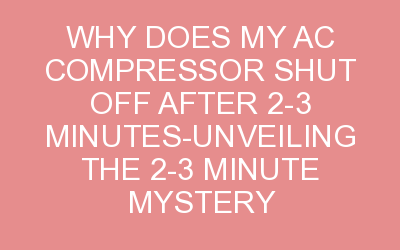
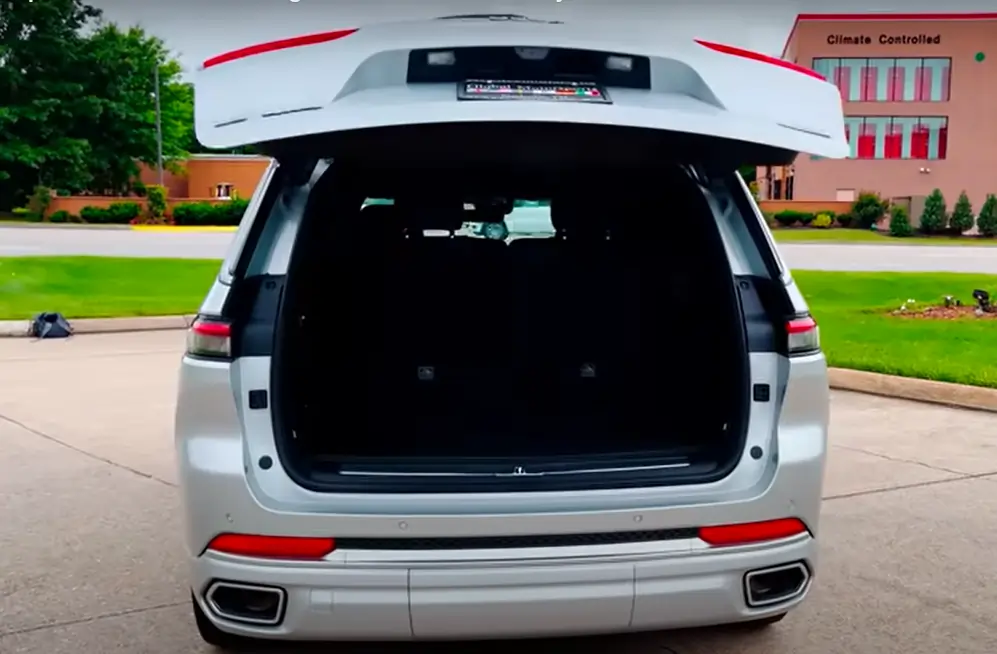





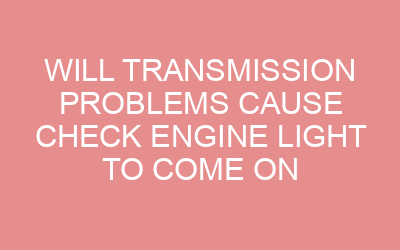
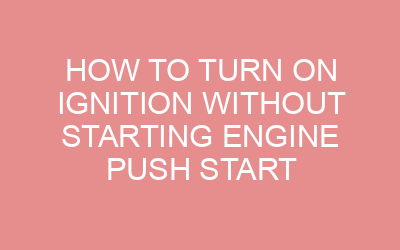



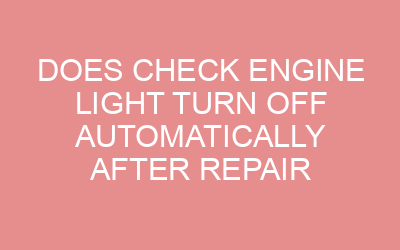
Leave a Reply